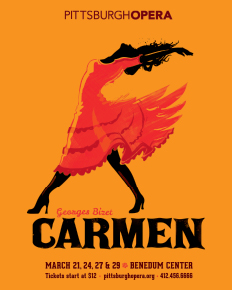TOO BIZET TO LOVE
CARMEN?
PITTSBURGH OPERA CHANGES THIS ROVING CRITIC’S MIND
By Tamar Cerafici
 I live in rural New Hampshire. It’s a hike to get to
anything “artsy.” So when my friend Bunbury said, “When you come to Pittsburgh,
we’ll go to Carmen,” I sort of jumped at the chance.
I live in rural New Hampshire. It’s a hike to get to
anything “artsy.” So when my friend Bunbury said, “When you come to Pittsburgh,
we’ll go to Carmen,” I sort of jumped at the chance.
To be frank, I’m not a fan of Carmen. My mother was a
coloratura soprano with a specialty in the Bel Canto style, so I was raised on
the works of Donitzetti and Puccini, where the mezzo soprano provides nice
support in quartets, and the melodrama is all focused on the woman with
tuberculosis. And I can never listen to Carmen without thinking of the
Gilligan’s Island “Hamlet” episode. But I was starved for culture – so of course
I went.
The Pittsburgh Opera’s production changed my mind about
Carmen. Here is a heroine full of fire and determination, played with dark
fervor by Rinat Shaham. Not a hint of a cough in site. Not one asthmatic
wheeze. She is a gypsy, used to the company of thieves. This is a character
that lives right up to the moment she doesn't.
I guess this production is just different from the many
others I’ve seen, or perhaps I was paying attention. Maybe the deft casting of
an intense mezzo and fine actress (Ms. Shaham is both) against a rather
aggressive (as opposed to lovesick) Don José underscored the violence that most
productions hide.
 |
Michaela fends off Morales
David Bachman Photography |
And this is a violent opera. Don José (AJ Glueckert) is
violent man. He tells his lieutenant, Zuniga (sung superbly by Philip Gay),
that he joined the army because he got in a fight with a man in his village –
given his jealous proclivities throughout, one assumes it was over a girl – and
he was forced to leave. José kills Zuniga to join Carmen and a band of thieves.
But I wonder: did he kill Zuniga primarily because the officer had a rendezvous
with Carmen? Then I wonder, what if he had to leave his village because he
killed his victim in a jealous rage? Little acts of violence permeate Marc
Astafan’s bleak production, and they all lead to the ultimate act of violence.
Carmen’s world itself is violent; Carmen’s murder seems a fait accompli. José
is drawn to her like a moth to the flame: we know somebody’s going to get hurt.
While Carmen is all fire and blood, Glueckert’s Don José
seemed a little pale. Glueckert’s tenor is light and seemed out of proportion
to Shaham’s rich and vibrant vocals. On the other hand, this seems intentional,
a result of Astafan’s direction and not the lack of vocal skill or quality. His
French diction could have been a little crisper, and he could have been more
ardent in his more important arias. I applaud his effort to draw sharp
contrasts between Carmen and her lover, though.
 |
Escamillo greets the ladies
David Bachman Photography
|
Speaking of Carmen’s lovers, Morgan Smith’s Escamillo was
the highlight of this production. He is a presence to contend with - the only
character that seems to match Shaham’s Carmen. They are perfect together. If
the Pittsburgh Opera want to bring him back, I can only say: Yes, please. This
was his debut performance with the company, and I wonder why it took
Christopher Hahn so long to find him. I would listen to him sing the phone
book, or even the editorial page of the Tribune-Review. That’s how good he is.
 |
Carmen Dances for Jose
David Bachman Photography |
The supporting cast was marvelous, but artist-in-residence
Jasmine Muhammad gets my vote as a standout. Micaela is a thankless part. All
she does is try to save Don José and remind the lost sheep of his fold back
home. She is the Greek Chorus to the larger tragedy playing out on stage, and
she really has no other job except to remind us that José had some worthy
characteristics at one time. She – Micaela, not Muhammad – always seems a
little co-dependent to me. But Muhammad played her character with clarity of
voice and urgency that rose above the part. Her Micaela was a woman of purpose.
 |
Gypsies surround Zuniga
David Bachman Photography |
On the whole, this Carmen is a production worth seeing. The
orchestra and chorus do solid credit to Bizet’s music. I would have really like
to see a flamenco or two (in that regard, Astafan fell short of the mark). I
might have wished a more impassioned Don José. But I understood Astafan’s spare
style, and appreciated it. Really, this is a spare opera. It is stark and lush
at the same time. The Pittsburgh Opera production gets that.
 |
Carmen accepts her fate.
David Bachman Photography |
 Former Pittsburgher and Environmental Attorney, Tamar Cerafici is author of the book Dominate, How Smart Lawyers Crush the Competition and the blog Legal Shoe.
Former Pittsburgher and Environmental Attorney, Tamar Cerafici is author of the book Dominate, How Smart Lawyers Crush the Competition and the blog Legal Shoe.
 I live in rural New Hampshire. It’s a hike to get to
anything “artsy.” So when my friend Bunbury said, “When you come to Pittsburgh,
we’ll go to Carmen,” I sort of jumped at the chance.
I live in rural New Hampshire. It’s a hike to get to
anything “artsy.” So when my friend Bunbury said, “When you come to Pittsburgh,
we’ll go to Carmen,” I sort of jumped at the chance. 











No comments:
Post a Comment